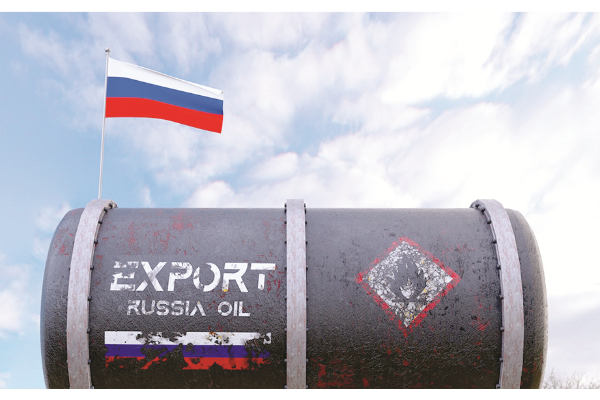Price cap will destroy Russia’s economy: Kyiv
Published on: Sunday, December 04, 2022
By: AFP
 Member states hope it will be the most damaging hit yet against the industry fuelling Putin’s war machine.
Member states hope it will be the most damaging hit yet against the industry fuelling Putin’s war machine.
BRUSSELS: Ukraine’s presidency on Saturday said a $60 price cap on Russian oil agreed by the EU, G7 and Australia “will destroy” Russia’s economy.“We always achieve our goal and Russia’s economy will be destroyed, and it will pay and be responsible for all its crimes,” Ukraine’s presidential chief of staff Andriy Yermak said on Telegram. But a cap of “$30 would have destroyed it more quickly”, he added.
ADVERTISEMENT
The European Union will join the G7 powers in imposing a $60-per-barrel price cap on Russian oil, the Polish ambassador to the bloc said, three days ahead of an EU embargo on imports by sea.
Poland had delayed approving the adoption of the plan while it pushed for a lower price ceiling and tough new sanctions to punish Russia for its war against Ukraine and starve its military of funds.
“We can formally agree to the decision,” Poland’s EU ambassador Andrzej Sados said, explaining that Warsaw’s fellow EU members had agreed to push forward with a new ninth round of sanctions against Russia.
“We’re working on the next package of sanctions, which will be painful and expensive for Russia,” Sados told reporters.
ADVERTISEMENT
The EU presidency, currently held by the Czech Republic, confirmed member state ambassadors had reached an agreement on the price cap and that the decision would enter into force when published in the EU official journal this weekend.
The oil price cap will run alongside the EU’s ban on imports of Russian oil, which comes into effect on Monday.
ADVERTISEMENT
Member states hope it will be the most damaging hit yet against the industry fuelling President Vladimir Putin’s Russian war machine.
European Commission chief Ursula von der Leyen said on Twitter that the price cap would help to “stabilise global energy prices, benefitting emerging economies around the world”.
Sados told reporters that Warsaw was reassured the EU had taken on board suggestions from Poland and the Baltic states for a tough new ninth round of sanctions.
A discussion paper circulated last month called for Gazprombank, which facilitates payments for Russian energy exports, to be kicked off the SWIFT international payments system.
It also proposed bans on the export of a wide range of consumer technology that could be pressed into use by the Russians and a ban on the importation of Russian diamonds.
Monday’s oil embargo will prevent shipments of Russian crude by tanker vessel to the EU, which accounts for two thirds of imports, the rest arriving by pipeline.
Energy experts like Phuc-Vinh Nguyen of the Jacques Delors Institute think tank estimate that Russia has earned 67 billion euros ($71 billion) selling oil to EU clients since its February invasion of Ukraine.
This alone is greater than Russia’s 60-billion-euro defence budget before the war and dwarfs the financial and military aid spent by EU states to support Kyiv’s pro-Western government.
The price cap is designed to make it harder to bypass the sanctions by selling beyond the EU.
China and India, for example, will still be able to import Russian oil, but under the proposed plan European insurers would be banned from covering tankers that carry oil trading at prices above the $60 ceiling.
Under the European plan, which will be coordinated with the United States, the G7 and other Western allies, if the market price of Russian oil falls below $60 then the cap will be cut until it is five percent lower than the market.
The price of Urals Crude, the main variety sold by Russia, is volatile but it was trading at around $65 per barrel as EU ambassadors met to discuss the level of the cap.
But Poland, a strong supporter of its neighbour Ukraine in the battle against the Kremlin’s forces, had earlier been holding out for a lower sum.
It reportedly wanted closer to just $30 a barrel, but Sados said that the market price was expected to rise and that $60 was now a reasonable starting point. Moscow has warned that it will not export oil to countries respecting a price cap.
Last week, Putin warned that any attempt by the West to cap the price of Russian oil would have “grave consequences” for world markets.
With Germany and Poland having decided to stop deliveries via a pipeline by the end of the year, Russian exports to the union will be cut by more than 90 percent, the Europeans say.
For Phuc-Vinh Nguyen, the proposed instrument raises many questions.
“An oil price ceiling has never been seen. We are in the unknown,” he said, stressing that the reaction of OPEC producing countries, or big buyers India or China, will be crucial.
According to the analyst, a cap—even at a high tariff—would send “a strong political signal” to Putin, because, once in place, this mechanism could be tightened.
Oil ministers from the OPEC+ oil producers’ group will meet in Vienna on Sunday.
Stay up-to-date by following Daily Express’s Telegram channel.
Daily Express Malaysia










